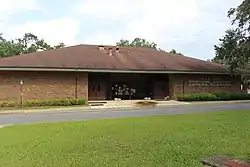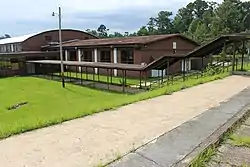Town of Havana | |
|---|---|
| Havana, Florida | |
 Cecil G. Trippe Municipal Building, Havana | |
| Motto: "Florida's Friendliest Small Town!" | |
 Location in Gadsden County and the state of Florida | |
| Coordinates: 30°37′27″N 84°24′54″W / 30.62417°N 84.41500°W | |
| Country | |
| State | |
| County | Gadsden |
| Incorporated | December 5, 1906 |
| Named for | Havana, Cuba |
| Government | |
| • Type | Council-Manager |
| • Mayor | Tim Loughmiller |
| • Mayor Pro Tem | Eddie Bass |
| • Council Members | Lawrence Reed, Matthew Wesolowski, Tabatha Nelson, Nick Bert, and Penny Key |
| • Town Manager | Kendrah Wilkerson |
| • Town Clerk | Shrylan Alexander |
| Area | |
| • Total | 2.83 sq mi (7.32 km2) |
| • Land | 2.79 sq mi (7.22 km2) |
| • Water | 0.04 sq mi (0.10 km2) |
| Elevation | 236 ft (72 m) |
| Population (2020) | |
| • Total | 1,753 |
| • Density | 629.22/sq mi (242.92/km2) |
| Time zone | UTC-5 (Eastern (EST)) |
| • Summer (DST) | UTC-4 (EDT) |
| ZIP code | 32333 |
| Area code | 850 |
| FIPS code | 12-29150[2] |
| GNIS feature ID | 0283812[3] |
| Website | www |
Havana is a town in Gadsden County, Florida, United States, and a suburb of Tallahassee. The population was 1,753 at the 2020 census. It is part of the Tallahassee Metropolitan Statistical Area. The town was named after Havana, Cuba, located about 530 miles (850 km) to the south.
History
Havana is of Taino origin, and honors the name of Cuba's capital.
In 1902, following the completion of the Georgia, Florida and Alabama Railroad, settlers moved a mile east to the present site of Havana, Florida. The railway town was important to the export of farming and tobacco. On December 5, 1906, Havana was incorporated into a town. The name "Havana" was proposed by James Mathewson, a schoolteacher. Shade tobacco was an important crop at that time.
On March 16, 1916, Havana was destroyed by a fire and 26 business-owned buildings were burned leaving only two remaining stores.
In recent times, much of the tobacco crop industry has declined and is known for its antiques, art galleries and specialty stores.
Geography
Havana is located in northeastern Gadsden County at 30°37′27″N 84°24′54″W / 30.62417°N 84.41500°W (30.624245, –84.414955).[4]
U.S. Route 27 passes through the center of town, leading southeast 16 miles (26 km) to the center of Tallahassee and north 25 miles (40 km) to Bainbridge, Georgia. Florida State Road 12 intersects US 27 in Havana; it leads west 12 miles (19 km) to Quincy, the Gadsden County seat.
According to the United States Census Bureau, Havana has a total area of 2.8 square miles (7.2 km2), of which 0.02 square miles (0.04 km2), or 0.57%, is water.
Climate
The climate in this area is characterized by hot, humid summers and generally mild winters. According to the Köppen climate classification, the Town of Havana has a humid subtropical climate zone (Cfa).
| Climate data for Havana, Florida | |||||||||||||
|---|---|---|---|---|---|---|---|---|---|---|---|---|---|
| Month | Jan | Feb | Mar | Apr | May | Jun | Jul | Aug | Sep | Oct | Nov | Dec | Year |
| Record high °F (°C) | 83 (28) |
85 (29) |
90 (32) |
92 (33) |
100 (38) |
102 (39) |
102 (39) |
101 (38) |
98 (37) |
95 (35) |
87 (31) |
84 (29) |
102 (39) |
| Mean daily maximum °F (°C) | 64 (18) |
67 (19) |
74 (23) |
79 (26) |
86 (30) |
90 (32) |
91 (33) |
90 (32) |
88 (31) |
81 (27) |
73 (23) |
66 (19) |
79 (26) |
| Mean daily minimum °F (°C) | 40 (4) |
42 (6) |
48 (9) |
52 (11) |
61 (16) |
68 (20) |
71 (22) |
70 (21) |
66 (19) |
57 (14) |
49 (9) |
42 (6) |
56 (13) |
| Record low °F (°C) | 4 (−16) |
0 (−18) |
19 (−7) |
31 (−1) |
36 (2) |
49 (9) |
60 (16) |
59 (15) |
48 (9) |
33 (1) |
20 (−7) |
12 (−11) |
0 (−18) |
| Average precipitation inches (mm) | 4.80 (122) |
4.92 (125) |
5.86 (149) |
3.68 (93) |
5.04 (128) |
5.92 (150) |
7.36 (187) |
6.78 (172) |
4.15 (105) |
4.11 (104) |
3.51 (89) |
3.77 (96) |
59.9 (1,520) |
Demographics
| Census | Pop. | Note | %± |
|---|---|---|---|
| 1910 | 432 | — | |
| 1920 | 448 | 3.7% | |
| 1930 | 1,169 | 160.9% | |
| 1940 | 1,221 | 4.4% | |
| 1950 | 1,634 | 33.8% | |
| 1960 | 2,090 | 27.9% | |
| 1970 | 2,022 | −3.3% | |
| 1980 | 2,782 | 37.6% | |
| 1990 | 1,654 | −40.5% | |
| 2000 | 1,713 | 3.6% | |
| 2010 | 1,754 | 2.4% | |
| 2020 | 1,753 | −0.1% | |
| U.S. Decennial Census[5] | |||
2010 and 2020 census
| Race | Pop 2010[6] | Pop 2020[7] | % 2010 | % 2020 |
|---|---|---|---|---|
| White (NH) | 775 | 715 | 44.18% | 40.79% |
| Black or African American (NH) | 937 | 899 | 53.42% | 51.28% |
| Native American or Alaska Native (NH) | 2 | 0 | 0.11% | 0.00% |
| Asian (NH) | 8 | 4 | 0.46% | 0.23% |
| Pacific Islander or Native Hawaiian (NH) | 0 | 0 | 0.00% | 0.00% |
| Some other race (NH) | 0 | 2 | 0.00% | 0.11% |
| Two or more races/Multiracial (NH) | 8 | 58 | 0.46% | 3.31% |
| Hispanic or Latino (any race) | 24 | 75 | 1.37% | 4.28% |
| Total | 1,754 | 1,753 | 100.00% | 100.00% |
As of the 2020 United States census, there were 1,753 people, 970 households, and 708 families residing in the town.[8]
As of the 2010 United States census, there were 1,754 people, 703 households, and 411 families residing in the town.[9]
2000 census
As of the census[2] of 2000, there were 1,713 people, 700 households, and 471 families residing in the town. The population density was 922.5 inhabitants per square mile (356.2/km2). There were 762 housing units at an average density of 410.4 per square mile (158.5/km2). The racial makeup of the town was 41.86% White, 56.74% African American, 0.06% Asian, 0.82% from other races, and 0.53% from two or more races. Hispanic or Latino of any race were 1.23% of the population.
In 2000, there were 700 households, out of which 26.7% had children under the age of 18 living with them, 41.1% were married couples living together, 20.6% had a female householder with no husband present, and 32.6% were non-families. 28.1% of all households were made up of individuals, and 14.9% had someone living alone who was 65 years of age or older. The average household size was 2.43 and the average family size was 2.96.
In 2000, in the town, the population was spread out, with 22.9% under the age of 18, 8.5% from 18 to 24, 25.3% from 25 to 44, 25.2% from 45 to 64, and 18.2% who were 65 years of age or older. The median age was 40 years. For every 100 females, there were 83.2 males. For every 100 females age 18 and over, there were 79.5 males.
In 2000, the median income for a household in the town was $27,344, and the median income for a family was $38,487. Males had a median income of $25,000 versus $19,958 for females. The per capita income for the town was $18,481. About 11.1% of families and 16.3% of the population were below the poverty line, including 18.3% of those under age 18 and 23.0% of those age 65 or over.
Education

The Gadsden County School District operates Havana Magnet School, which serves elementary and middle school grades. Gadsden County High School (formerly East Gadsden High School), outside of the city limits, is the only zoned high school in the county.
Previously the Havana area had three schools: Havana Elementary School, Havana Middle School, and Havana Northside High School.[10] Havana Elementary began using the Accelerated School program in Spring 1995 in order to improve academic performance. In 2001, Havana Elementary, which occupied an 18-acre (7.3 ha) area, had about 100 employees and 1,000 students; most of the students were low income, and 95% of the students were from African-American families.[11] In 2003 Havana Northside High School and James A. Shanks High School in Quincy consolidated into East Gadsden High.[12] In 2017, the high school section of West Gadsden High School consolidated into East Gadsden High, leaving the latter as the only remaining zoned high school in the county.[13]

Tallavanna Christian School, a private school, is in an unincorporated area near Havana.
 Former Havana Elenentary School
Former Havana Elenentary School Former Havana Northside High School
Former Havana Northside High School
Transportation
The Gadsden Connector, a bus route operated by Big Bend Transit, has a stop in Havana.[14]
References
- ↑ "2020 U.S. Gazetteer Files". United States Census Bureau. Retrieved October 31, 2021.
- 1 2 "U.S. Census website". United States Census Bureau. Retrieved January 31, 2008.
- ↑ "US Board on Geographic Names". United States Geological Survey. October 25, 2007. Retrieved January 31, 2008.
- ↑ "US Gazetteer files: 2010, 2000, and 1990". United States Census Bureau. February 12, 2011. Retrieved April 23, 2011.
- ↑ "Decennial Census of Population and Housing by Decades". US Census Bureau.
- ↑ "P2 HISPANIC OR LATINO, AND NOT HISPANIC OR LATINO BY RACE - 2010: DEC Redistricting Data (PL 94-171) - Havana town, Florida". United States Census Bureau.
- ↑ "P2 HISPANIC OR LATINO, AND NOT HISPANIC OR LATINO BY RACE - 2020: DEC Redistricting Data (PL 94-171) - Havana town, Florida". United States Census Bureau.
- ↑ "S1101 HOUSEHOLDS AND FAMILIES - 2020: Havana town, Florida". United States Census Bureau.
- ↑ "S1101 HOUSEHOLDS AND FAMILIES - 2010: Havana town, Florida". United States Census Bureau.
- ↑ "Schools." Gadsden County School District. April 6, 2001. Retrieved on April 6, 2017.
- ↑ "HES Bio." Havana Elementary School. December 4, 2001. Retrieved on April 7, 2017.
- ↑ Miller, Brian (January 30, 2017). "Striplin goes from West Gadsden to East, schools likely to consolidate". Tallahassee Democrat. Retrieved April 5, 2017.
- ↑ Jiwanmall, Stephen (April 4, 2017). "Gadsden County Schools to Consolidate in 2017-18". WTXL. Retrieved April 6, 2017.
- ↑ "Big Bend Transit | COORDINATED TRANSPORTATION SYSTEM OF GADSDEN COUNTY". www.bigbendtransit.org. Retrieved January 31, 2019.
